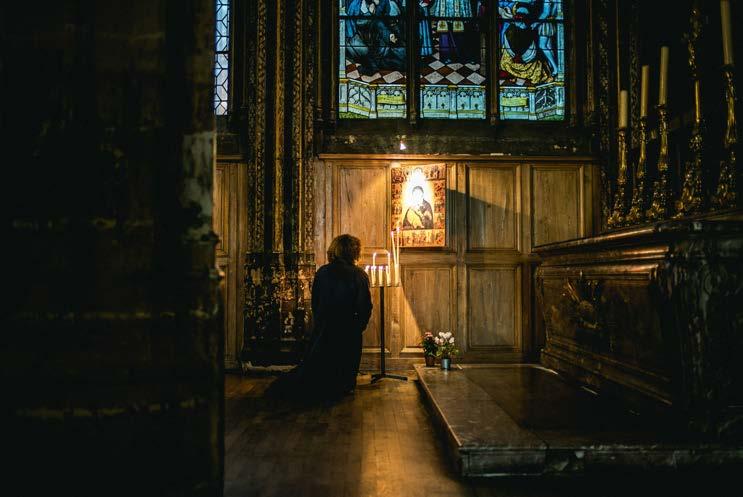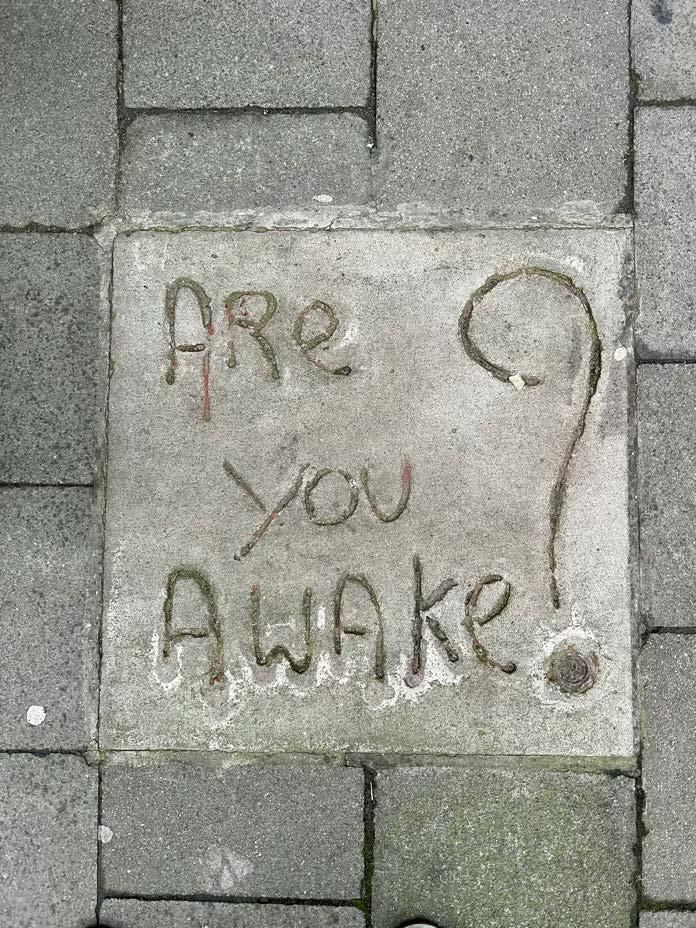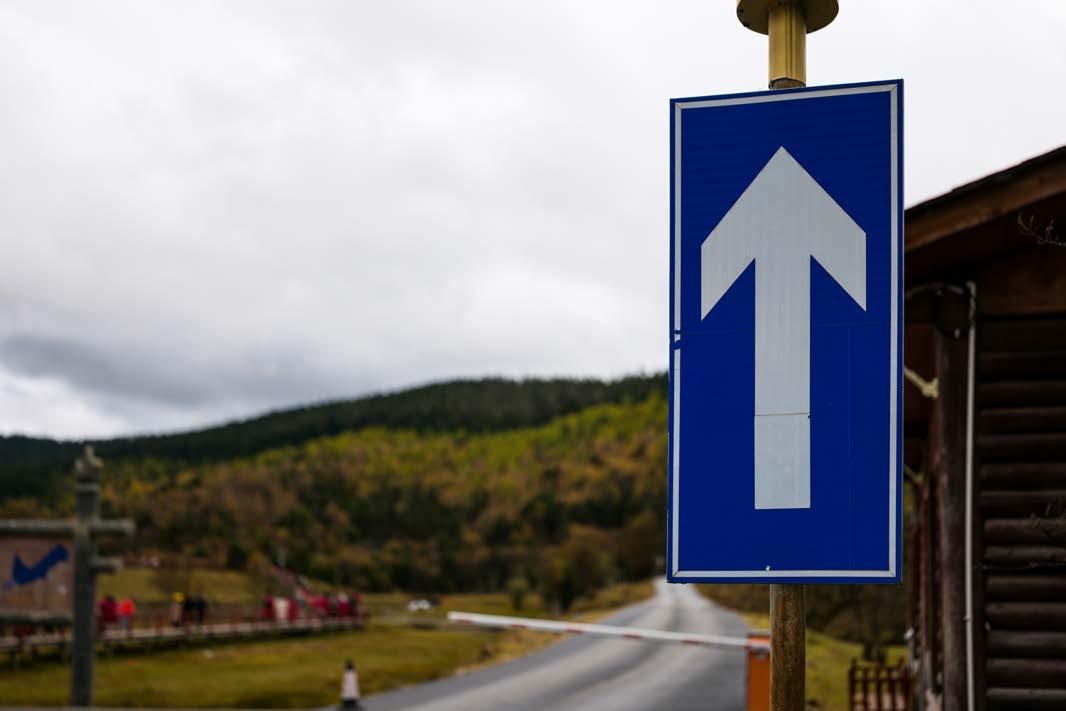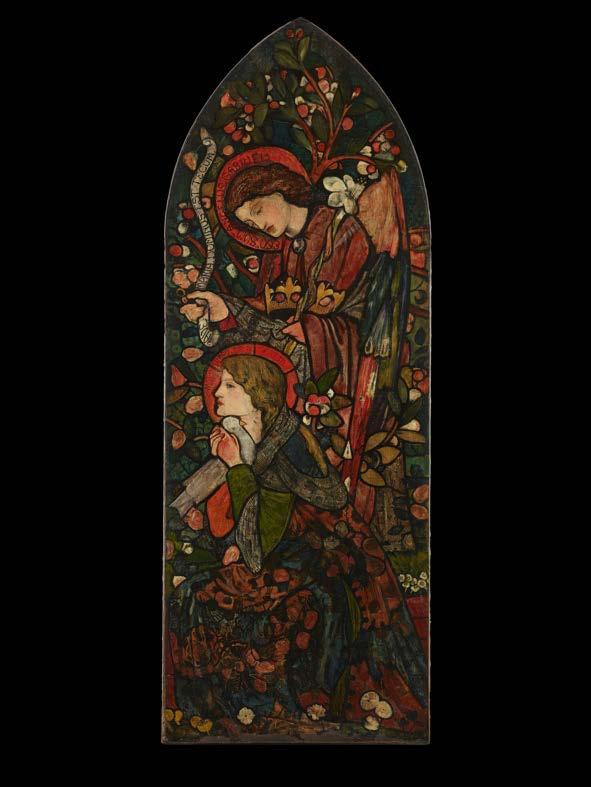The Episcopal Diocese of West Virginia
Editor’s Note:
The following meditations are offered by members of the Diocese of West Virginia for your use during this Advent season.
The meditations for each week all focus on some aspect of that week’s collect and/or readings; we encourage you to read and pray through the collects and lessons at the beginning of each week before moving on to the daily meditations. It is our hope that your prayer and study will be deepened and strengthened by hearing different reflections on the same sets of readings throughout the weeks of Advent.
Unless otherwise noted, all images in this booklet are free stock images from Unsplash.com.
Finally, we give thanks to each person who offered their gifts for the creation of this resource.
The First Week of Advent, Year C: Watch
Almighty God, give us grace to cast away the works of darkness, and put on the armor of light, now in the time of this mortal life in which your Son Jesus Christ came to visit us in great humility; that in the last day, when he shall come again in his glorious majesty to judge both the living and the dead, we may rise to the life immortal; through him who lives and reigns with you and the Holy Spirit, one God, now and for ever. Amen.
Jeremiah 33:14-16
1 Thessalonians 3:9-13
Luke 21:25-26
Psalm 25:1-9
The First Sunday of Advent December 1, 2024
I wear a wristwatch. A real watch. My automatic, squarestyled Rado “Manhattan” with rhinestone green hour markers from 1972 is considered old tech these days.
And I love it.

Nowadays, many of us wear “smartwatches” that can do everything from telling us our heart and perspiration rates to making phone calls and receiving text messages. My old tech, though, keeps me just a little more closely connected to the previous humans who relied on mechanics rather than radio waves and GPS to navigate days and nights and the passage of time. Because it requires a little more attention than just keeping the battery charged on an GPS synchronized smartwatch, my wristwatch actually helps me to be a little more watchful. I’m accustomed to making minor adjustments if it’s running a little fast or slow, advancing the day on the day/date function when a month has less than 31 days, and occasionally cleaning the crystal or getting its Swiss movement serviced to keep it in shape. This old tech helps to ground me, even as it is a delightful conversation piece on my wrist. This Advent, consider what old tech will help you to “watch” your time and function more closely. What older ways of doing things will help you to connect to previous humans and help you to slow down and watch your activities more closely? Perhaps it’s time to drive somewhere new without using GPS; read road signs, get lost, and find your way again. Maybe make that one recipe from scratch with those old kitchen implements; graters, sifters, and even manual coffee grinders. Read a book or magazine at night in Advent, rather than screen scrolling, and keep lights low. If you have a good, clean oil lamp, even read by that. Rediscover old tech this Advent to help you to connect; and pay attention to what happens in your soul this season. Happy “watching.”
The Rt. Rev. Matthew D. Cowden is the VIII Bishop of West Virginia.
Monday in the First Week of Advent
December 2, 2024
"Watch with me and pray," Jesus commanded the disciples in the Garden of Gethsemane. In this season of Advent, as we watch and pray for the coming of Christ, many of us experience our own “Gethsemanes” as we pray for the cups of war, division, hatred, and conflict to pass from us. Like many of the disciples, we hope and look for the coming of the Messiah.
We wait with longing for the justice and peace of the Kingdom of God. We yearn for an end of disease, destruction, and death.
“Let this cup pass from us,” we pray.
Our souls wait for the Lord more than the watchmen for the morning; Indeed, more than the watchmen for the morning. (Psalm 130:6)
A song of Taizé tells us: "Wait for the Lord, whose day is near… wait for the Lord, keep watch, take heart."
Yet as we watch, if we listen and look closely, we see that Jesus comes to us each day in many moments. Jesus comes in a child's smile, over coffee with a friend, in a patch of blue sky dividing the clouds, in the eyes of the poor, in the beauty of each season.
Jesus indeed returns to us in the midst of our watching. We need not wait to see Him.
Andrew Nicely is a member of Christ Church, Fairmont.
Tuesday in the First Week of Advent
December 3, 2024
In Luke 21:25-36, Jesus speaks of signs in the sun, moon, and stars, and the distress of nations. These powerful cosmic images depict a world in turmoil, where fear and uncertainty abound. Yet in the midst of this chaos, Jesus calls us to "stand up and raise your heads, because your redemption is drawing near" (v. 28). The central message here is one of watchfulness an alertness to God’s work in the world, even when all seems lost.
The theme “Go Tell It on the Mountains” invites us to proclaim what we see, even in times of challenge and uncertainty. The "mountain" symbolizes a high place of vision, where we can see more clearly what God is doing and share that vision with others. It is a place of proclamation, calling us to witness to the hope and redemption God is bringing, no matter how chaotic the world appears.
In the context of “watching,” this means being awake to the signs of God's kingdom breaking into our world. Jesus reminds us that life can sometimes feel like a stormy sea or a darkened sky, but the faithful are called to watch for signs of hope. We are no t passive observers, but active participants in this proclamation. Like the shepherds who witnessed the angelic message of Christ’s birth, we are to "go tell it on the mountain," declaring that in the midst of turmoil, Christ’s kingdom is near.
This Advent, as we wait and watch, let us remain alert and ready, not only to see God’s signs but to proclaim them with joy, hope, and expectation. God’s redemption is drawing near let us tell the world. In watching, we are called to live in hopeful anticipation, standing firm in faith, and sharing the Good News. We are Christ’s messengers, proclaiming his presence in both the quiet moments and the cosmic events.
The Very Rev. Tommy Sheppard serves Trinity, Moundsville.
Wednesday in the First Week of Advent
December 4, 2024
Jesus tells us in Luke 21 to “be on guard. … Be alert.” Other translations of verses 34-36 tell us to ‘take heed,’ ‘be careful,’ and ‘watch out.’ This language suggests something terrible or frightening will come to pass.
What are we called to watch out for in these dire verses? Worry. Drunkenness. Carousing. Indulgence. The cares of this life. As we approach the secular holiday season, those situations certainly are worrisome.
At the same time, as we approach this most holy of seasons, we would be wise to remain openminded.
A recent care of my life has involved some dental issues. Returning from a recent trip to a new dentist, I stopped at a Starbucks. I took my drink to a small table in the corner. It happened to be Halloween. Spooky music was playing from a speaker that changed colors in time to the beat. The baristas were in costume. I indulged in a bit of people-watching.
A woman wearing a most incredible coat sat at the next table; her sister delivered their coffees. I remarked on her outerwear and she told me it was her ‘coat of many colors.’ I knew the story from Genesis and from Dolly Parton’s memorable song.
These women were friendly, outgoing, charming. They offered their business cards as they left the coffee shop.
One sister was Joy. The other was Faith … Hope.
This was surely a sign for me. What else could I watch for, as I face life’s worries and cares? I was coming from the dentist, never a pleasant experience for me, and heading to physical therapy later that afternoon. And in between, because I was paying attention, love showed up in the form of two happy sisters willing to share a few minutes with a stranger.
Keep watch for faith, hope, joy, and love this season. They could be sitting right next to you.
Debbi McNeer is a member of Ascension Episcopal Church in Hinton, part of the New River Episcopal Ministries.
Thursday in the First Week of Advent
December 5, 2024
When my niece Tessie was a toddler, she thought that when her family had to “watch” her aunt’s dog Charlie that she had to literally watch him – her eyes glued on his movements which she, of course, reported to her mother.
The writer of Psalm 25 “watches” the soul like Tessie watched Charlie – and reports back to God, acknowledging personal shortcomings and concerns with “enemies.” While we might not have enemies and our transgressions might seem trivial, we can also “watch” and report to God in prayer, trusting in God’s “compassion and love, for they are from everlasting.” (line 5)
Since the Middle Ages this psalm began the new church year. The chanted introit, “Ad Te Levavi” would have been as familiar to Christians then as “O Come O Come Emmanuel” is to us today.
What does it mean to lift our souls to God? And how can we do this during Advent, a time of year full of traditions that can become routine or even feel like duties? A time of year when anticipation and excitement are often replaced by nagging expectations or sorrow? Psalm 25 suggests meeting the new church year with candid inner speculation in our prayers and with a faith that God is gracious.
The Hebrew word for soul that the psalmist uses, “nephesh” denotes not just the soul, but the face, throat, and chest- our identity and where our vital signs are most visible. So, this Advent, let us watch what is within us, tell God in prayer, and watch what God reveals in response.
The Rev. Deacon Nicole Taggart serves Trinity, Martinsburg.
Friday in the First Week of Advent
December 6, 2024
Watch!
Watch the clock, watch the kids, watch for the pot to boil. Watch the news, watch the game, watch for the package to be delivered.
Watch the birds, watch the sunrise, watch for the first fireflies of summer.
Watch for that which is to come, for that which is to happen.
Watching connects us to the future.
We watch to see what’s going to happen in hopes that it goes as we expect.
The kids will be ok, the water will boil, the sunrise will be gorgeous, the game will be exciting, Christ will come again.
The Gospel goes further – be on guard, be alert, raise your heads. This is intense watching and praying so that we have the strength to escape “all these things” that are coming upon the world. But when? How long do we watch? Our watching can turn to worry, our hearts become weighed down. What is this mystery of ‘the Son of Man coming in a cloud’? Will I be able to stand before the Son of Man? And what about now, today?
We find an answer in our psalm.
To you, O LORD, I lift up my soul; (I watch) my God, I put my trust in you;
In turning our watch toward God, we see God’s ways. We are led into truth. God’s grace guides us into doing right. Looking down the paths of the Lord we find love and faithfulness.
An old hymn reminds us of the intimacy of focusing our watching on Christ.
Turn your eyes upon Jesus, Look full in His wonderful face, And the things of earth will grow strangely dim, In the light of His glory and grace.
Dear God:
May we remember to watch for Christ coming in everyone we meet. Today, through Advent and all the days of this life. AMEN.
Barbara Lutz is a member of St. James’, Lewisburg.
Saturday in the First Week of Advent
December 7, 2024
Some years ago, while I was serving in McDowell County, I visited a home to speak with the homeowner who had requested a mission team help her with repairs. She was a 70-something grandma. Her grandson caught wind that I was there and ran over to see this “out of towner.” He was quite a rambunctious child. I wasn’t bothered much by his behavior, but she sure was. When she’d had it with him, she looked him in the eye and said, “Is this where you want to be if Jesus came back?” He responded by hanging his head low and said, “No, ma’am.” “Watch it,” she ended with a snap.
Oh, the things we could learn about life and faith from an Appalachian mountain momma!
“The days are surely coming,” Jeremiah tells us on Advent I, where God “shall execute justice and righteousness.” And Jesus tells us there will be signs that the Son of Man is coming. We are encouraged to be on guard, to keep awake. Watch. This is important as we begin this Advent season and prepare ourselves for Christmas joy. But we must be mindful of what we are called to be watchful for. Are we merely watching for Christmas or are we watching for Christ?
With all there is to do to get ready for the holidays, no one needs to tell us to “keep alert and keep awake.” With everything that’s going on, of course we’re going to be getting ready for Christmas. But are we truly getting ready for Christ? Are we awak e to more worldly ways and asleep to the spiritual realities of the season? I may not be physically asleep, but in preparation for Christmas, I risk being asleep (or I risk exhaustion) in a spiritual sense, where I might fail to see God breaking into the world. Let us then live these next few weeks as if Christ were near and at our door. In the busyness of the season, may we reflect the life of the one whom we watch for lives that reflect compassion, generosity, mercy, and humility towards our neighbor.
The Ven. Josh Saxe is rector of St. Matthew’s, Wheeling, and Archdeacon for Community Resilience & Disaster Response Ministries.
The Second Week of Advent, Year C: Prepare
Merciful God, who sent your messengers the prophets to preach repentance and prepare the way for our salvation: Give us grace to heed their warnings and forsake our sins, that we may greet with joy the coming of Jesus Christ our Redeemer; who lives and reigns with you and the Holy Spirit, one God, now and for ever. Amen.
Baruch 5:1-9 or Malachi 3:1-4
Philippians 1:3-11
Luke 3:1-5
Canticle 4 or 16
Sunday in the Second Week of Advent
December 8, 2024
John the Baptizer was not very powerful by worldly standards, unlike the list of leaders Luke gives us. Most people probably thought John a bit strange, even offensive. But the impact he made was incalculable, because he was the pathfinder who laid the way for Jesus, preparing people to receive him into their hearts for the hope of salvation.
Quoting from the prophet Isaiah, John spoke of filling valleys and lowering hills and straightening the crooked and smoothing out the roughness. Where was this going to happen?
Where were those preparations occurring? Inside the human heart.
The way of the Lord resides within each of us, people of faith who embrace the word of hope. Our souls need to be made full and even and straight and smooth, like a good runway for planes, so that Jesus has a suitable place to fly down and land.
Consider during Advent, this great season of pregnant anticipation, where God might sand down rough edges so that you can be even enough for Jesus to arrive humbly yet triumphant.
What might that look like for you? How might it feel?
Then reflect on how God calls us to speak as prophets from a place of peace, so that the truth of God’s loving justice can receive proclamation by word and deed, making a promise of God’s renewal.
The Very Rev. Michael Delk is rector of St. Thomas à Becket, Morgantown
Monday in the Second Week of Advent
December 9, 2024
Reflecting on Baruch 5:1-9, I’m struck by the themes of hope and transformation. The call to "put on the splendor of God’s glory" resonates deeply, reminding me that even in times of struggle, there is potential for renewal. It speaks to the importance of shedding our burdens and embracing a new identity, one rooted in faith and divine promise.
The imagery of returning from exile evokes feelings of longing for home and belonging. It makes me think about my own journey how often do I feel lost or disconnected? This passage reassures me that no matter how far we stray, there is always a path back, guided by a loving presence.
Ultimately, Baruch 5:1-9 inspires me to cultivate hope in my life, to trust that transformation is possible, and to remain open to the beauty and glory that can emerge from difficult times. It’s a reminder that change is not only possible but promised, encouraging me to embrace new beginnings with faith and anticipation.
Toni Limbers is the music director at Christ Church, Clarksburg/St. Barnabas Chapel, Bridgeport.
Tuesday in the Second Week of Advent
December 10, 2024
What is required of the person who seeks the coming of Salvation into one's life? According to the wisdom of the scribe, Baruch, the Jews returning from exile in Babylon needed to prepare for the glory to come upon the return to Israel by being faithful, obedient, accepting of the mercy of God, and affirming of the justice of God. The prophet Malachi refers to the processes used to purify silver in flames and to clean one's garments; those who wish to know God need similar purification from sin. Paul indicates to the Philippians that his previous status as a high-ranking, faithfully observant Jew means nothing to him now that he knows the righteousness that comes through faith in Jesus Christ. And John, son of Zechariah, known as "the Baptist," says that it is the work of everyone who believes in the teachings of Jesus to prepare the way of the Lord, to make the paths straight, the rough roads smooth, and that this work will allow the ones who undertake it to see the salvation of God.

"Prepare" means: what we do before we are ready for what lies ahead. In the original Latin, readiness does not occur without action beforehand: prae-parare. The wisdom of the prophets points to strengthening one's faith through obedience to God's law, gratitude for God's gifts, and understanding that such gratitude includes all of those gifts, justice as well as mercy, obedience (that which comes from listening) as well as grace. Readiness for salvation implies that one accepts the need for the purification of remorse, followed by repentance, or turning away from old and harmful patterns, and into the ways of righteousness. And once we have prepared ourselves, we are charged with the responsibility of preparing and smoothing the way for others. God, in Jesus Christ, offers love, with the hope that as we grow, we learn the value of anticipating, and readying ourselves for, the next steps on the way to God's Presence. That is the holy journey of Advent. Are you ready to do the holy work?
The Rev. Georgia DuBose is priest-in-charge of Grace, Middleway.
Wednesday in the Second Week of Advent
December 11, 2024
Many know where they were when significant historical events occurred, like 9/11 or when President Kennedy was shot. Luke’s Gospel on Advent 2 begins with a timeline to fix it historically. Luke describes the political world, then describes the religious world in Jerusalem via who was high priest. Luke points to John, in the wilderness in the region of the Jordan - a place of testing, of solitude, of discernment. The Jordan marked the boundary of the land of promise. John immersed people in the Jordan. In leaving the water they re-entered the promised land to reclaim it. This was both a religious ritual and a very personal statement or recommitment.
We may forget that our real work in this season is not preparing for Christmas, it is to prepare ourselves for the coming of God into our hearts and lives. The message of John is very clear. God’s reign is around, is within us. Prepare! Only when we prepare will we see the salvation of God in our midst. It is not our roads we need to put in order but our lives, our choices, our actions, our priorities. And truthfully no one can do this FOR us. No one can get me ready but me. No one can discern what my gifts are and how I will use them. No one can create space in my life or schedule to prioritize moments of quiet for reflection and prayer if I do not make it my priority.
The Rev. Donald Hill is priest associate at Lawrencefield Parish Church in Wheeling.
Thursday in the Second Week of Advent
December 12, 2024
In college my focus was archaeology, specifically that of the Near East and what we now call the Holy Land. I had a beloved professor, an old Jesuit, who used to say that in the understanding of the ancient world, the word “shalom”, didn’t so much mean ‘peace’ in the way we see it. Rather, and this is some insight into the man’s quirkiness and part of why we loved him so much, the concept could be understood as “may you get what you deserve.” Not in a punitive sense, but one of balance. Peace, not as absence of conflict, yet of wholeness – a state where everything is brought into equilibrium and those things which keep us out of alignment are either removed, like Malachi’s refiner’s fire and fuller’s soap or lifted up to fill in the places lacking – a wholeness for our souls grounded in the knowledge that in God, we are truly enough.
For this week’s passage from Luke, John the Baptist echoes the words of the prophet Isaiah calling for new, even pathways. The lowering of mountains and filling valleys, the crooked made level and the rough made smooth. The very same wholeness of which we hold out hope for Christ to bring to the world and into our very lives. In Advent, we wait expectantly for his return, fixed in the knowledge that he will do this in all of our hearts – that in him is the true and lasting ‘Shalom’ for our souls.
The Rev. Gethin Wied is rector of Trinity, Shepherdstown.
Friday in the Second Week of Advent
December 13, 2024
In this week’s lessons, we see a motif of flattened mountains, filled valleys, straightened roads, and the rough made smooth, all in preparation for the way of the Lord. And in Paul’s letter to the Philippians, we see that this preparation is extended to all of us, as he repeatedly invites “all of you” to let your love “overflow more and more,” so that we may be purified for the day of the Lord. Advent is the season of preparation awaiting the birth of Jesus the Christ, but it is important to note that we see this preparation as an invitation to each and every one of us.
We are invited to return to the story of Jesus, examining ourselves in preparation for his arrival. This week, as I prepare myself for Christmas, as I prepare for the coming of Christ, I am reminding myself that allowing my love to overflow is the greatest preparation of all. I’d invite you to do the same: let your love be what paves the road in this preparatory season of Advent. It is love that comes through Jesus for the glory of God that will be enough to flatten mountains, fill valleys, straighten the crooked roads, and make the rough smooth.
Fiona Reynolds is the president of Vespers: The Episcopal Campus Ministry at Marshall University.
Saturday in the Second Week of Advent
December 14, 2024
One of my favorite features of the readings from the Gospel of Luke on the Second Sunday of Advent and on Christmas Eve is the list of names and Luke mentioning their political power. The Christmas story begins with Caesar Augustus flexing imperial might by ordering a census that disrupts the life of the Jewish people under his rule. It mentions who is governor in Syria. All of this, in the setting of Jesus’ birth is to then say, “But now I’m going to tell you about someone who actually deserves our attention.” Luke does the same thing in this reading about the ministry of John the Baptist, the forerunner to Our Lord Jesus Christ. The Emperor, the Governor of Judea, and the puppet king in Galilee are all named, but the real story here is about this voice crying out in the wilderness, “Prepare the way of the Lord.”
The true story and true power are not centered on earthly princes, but rather it focuses on the Prince of Peace, Jesus Christ, who came to overthrow our true enemies, our ancient enemies: sin, death, and the devil. The Gospel is the message that through th e life, death, and resurrection of Jesus, the Son of God, these enemies have been defeated. When the Son of Man ascended to heaven and was seated on the right hand of the Father, he was enthroned to rule in the midst of His enemies until his glorious appearing when the dead shall be raised to life and He will judge us all according to our deeds, some to eternal life and others to eternal condemnation.
These readings serve as a reminder that our trust ultimately rests in the one who wields true power and not with those who wield political power in the nations of the world. Their time is passing away, and it is Christ who rules supreme and in whom we should put our hope. When we place our hope in earthly princes, we make antichrists of them, because an antichrist is one in whom we place our hope and our trust instead of Jesus. The reason Emperor Nero was the prototypical antichrist is because people truly believed and hoped in a story that he would return from death to restore the glory of Rome. We should despair in earthly politics no more than we should put too much hope in them. Rather, we should hope only in the one who has come to save us all.
The Rev. Paul Castelli, OCS, is Vocations Director for the Diocese of West Virginia and Campus Missioner to West Virginia University.
The Third Week of Advent, Year C: Rejoice
Stir up your power, O Lord, and with great might come among us; and, because we are sorely hindered by our sins, let your bountiful grace and mercy speedily help and deliver us; through Jesus Christ our Lord, to whom, with you and the Holy Spirit, be honor and glory, now and for ever. Amen.
Zephaniah 3:14-20
Philippians 4:4-7
Luke 3:7-18
Canticle 9
Sunday in the Third Week of Advent
December 15, 2024
Gaudete in Domino semper: iterum dico, Gaudete!
“Rejoice in the Lord always. I say again, rejoice!”
Modestia vestra nota sit omnibus hominibus. Dominus prope est.
“Let your gentleness” your forbearance, your modesty be noted by all people. The Lord is near!”
These are the words that give today its name Gaudete Sunday, "Joyful Sunday." Since the early days of the church, mass on the third Sunday of Advent began by chanting this marvelous command from the fourth chapter of St. Paul’s letter to the Philippians: Be joyful in the Lord!
On “Joyful” Sunday Christians around the world light the pink Advent candle, some churches put out their pink or “rose” altar hangings, and the preparations for the great Feast of our Lord’s Incarnation take on a more festive tone.
All of our readings for the third Sunday in Advent speak about joy…except, it would seem, our Gospel lesson. In this lesson from the Gospel of Luke, John the Baptist preaches fire and brimstone to those who came out to the wilderness to hear him. At first read, John’s warning to his listeners doesn’t really exude “joy,” and it certainly doesn’t seem as festive as the other readings. But yet, to those who listened and sought repentance, there wasn’t just condemnation, there was opportunity an opportunity to amend a life. John says to the sinners, tax collectors, and soldiers who come to him asking what to do in order to live righteously to change their ways and be upright in their dealings and generous with their charity. The joy behind this exchange is that every time we fail to love one another, or fail to love God, we have the opportunity to change to make it right, to make amends, and to try and do better. Our joy in the Gospel lesson is that we are loved and forgiven. For that we can rejoice, as long as we take the admonition of John to heart. God’s love and forgiveness allows each of us sinners to celebrate.
Gaudete in Domino semper: iterum dico, Gaudete!
“Rejoice in the Lord always. I say again, rejoice!”
Let us take this joy to a hurting and broken world…with our gentleness our forbearance, our modesty…and let it be noted by all people this Advent and all our lives.
The Rev. Canon Chad Slater is Canon to the Ordinary for the Diocese of West Virginia.
Monday in the Third Week of Advent
December 16, 2024
Rejoice & repentance. What in creation do rejoicing and repenting have in common?!
Great question ~ more on their commonality in a bit.
We're situated in the 3ʳᵈ week of Advent, journeying closer to our festive celebration of God's incarnation. Our Church of England sisters & brothers refer to the 3ʳᵈ Sunday of Advent as, "Stir Up Sunday," from our collect," Stir up your power, O Lord, and with great might come among us; and because we are sorely hindered by our sins, let your bountiful grace and mercy speedily help and deliver us..."
Many don't like acknowledging that we are hindered by our sins, self included. And still, truth is truth. Sins lure us away from experiencing our connection with Christ.
John the Baptist comes to us in Luke's Gospel this week, reminding us to bear fruits worthy of repentance. The very act of repenting redirects our hearts and minds toward God as we admit our faults to God and our neighbor. Repenting sets us back on course to knowing the Good News of God in Christ AND proclaiming this Good News through our actions and words.
Repentance is cause for great rejoicing as we go forth into the world being made right with God and with our neighbor. May we have the courage to look at our lives, to choose repentance, and to rejoice that our Creator and Redeemer draws ever nearer.
The Rev. Eric L. Miller is rector of St. John’s, Charleston.
Tuesday in the Third Week of Advent
December 17, 2024
When my friend L was dying, the cedar waxwings came. I’d been sending him inspiring quotes every morning, but when the waxwings came, I sent photos.
It did my heart good to hear your excitement about those birds! He responded. It’s on my calendar to remind you to look for them this time next year.
L never made it to next year, but I cannot see a cedar waxwing without thinking of him. It’s because of him the cedar waxwings are on my calendar. I wait for them every year.
The Christmas season can be full of so much goodness, but it can also be a time of sadness at the empty chair at the table.
Can we put joy on the calendar? This third week of Advent is a time we are repeatedly reminded to rejoice. This can be difficult when missing someone we love.
Yesterday, they came.
When I stood at the window and watched the waxwings flocking to our tallest maple, joy flooded my soul. So beautiful with that black mask and yellow-tipped tail feathers like they’ve been dipped in sunshine. The joy at their beauty was all the richer for the sorrow of missing my friend. And God-With-Us bumped up against my shoulder as we delighted together.
True joy is not something we can manifest. It is a supernatural gift. Sometimes I need that calendar reminder to open myself up to receiving this gift to slow down and feel the joy of the real meaning of Christmas: God is in our midst!
Laura Boggess is a member of St. Timothy’s in-the-Valley, Hurricane.
Wednesday in the Third Week of Advent
December 18, 2024
‘Rejoice in the Lord always; again I will say, Rejoice’ (Philippians 4:4, NRSV).
As Advent unfolds, we are invited into joy, encouraged to let our spirits lift in the knowledge of God’s love-even while we wait. For many, this season’s joy brings to mind a simpler time, perhaps even a nostalgia for an earlier time. Those days felt less complicated, not just because we were younger, but because we connected through shared, in-person experiences. Joy felt closer like the thrill of playing a favorite cassette, the laughter over pizza with friends, or the warmth of a handwritten note.
In our fast-paced world, finding that kind of joy takes intention. Paul’s reminder tells us that true joy isn’t in things or accomplishments but in the closeness of the Lord. ‘Do not worry about anything,’ he writes, ‘but in everything by prayer and supplication with thanksgiving let your request be made to God’ (Phil. 4:6).
Advent gently nudges us to refocus-to find joy that isn’t weighed down by distractions but is deeply rooted in God’s enduring peace. This season invites us to put aside our worries and let a simple, wholehearted happiness take root. So, as we move through Advent, may we experience God’s love anew, allowing ourselves to feel the lasting joy of a heart lift ed in faithjust as freely as in those simpler times.
The Rev. Bill Sigler serves the New River Episcopal Ministries, primarily Good Shepherd, Hansford.
Thursday in the Third Week of Advent
December 19, 2024
“Rejoice in the Lord Always and again I say Rejoice – Philippians 4:4
Though writing from prison, St. Paul’s theme as he writes to the church in Philippi is REJOICE! To be clear, this is not the same as ‘Don’t Worry, Be Happy!’ For St. Paul, rejoicing is deeply rooted in joy – a joy that is rooted in knowing and trusting God through Jesus Christ. Paul has come to know through his intimate relationship with Christ the unconditional love and uncompromising foundation for his faith. He encourages the young church, and us, to be unified in our faith that brings joy so that we and the church will be strengthened to answer the call of all followers of Jesus to preach the Good News, no matter the circumstances.
Paul’s admonition to rejoice even in times of fear, hardship and suffering is particularly poignant because he is incarcerated – perhaps facing death. However, Paul finds that his circumstances are providing him with an opportunity to witness to the goodness of God! This brings him deep joy even in the face of great adversity. Philippi is told to guard their hearts, bring peace, and foster joy. Continually looking for reasons to rejoice builds our resilience and keeps us centered on God’s love and protection.
Paul’s message reminds us that rejoicing isn’t just a feeling – be happy – but it is an expression of trust, gratitude, and peace and we center our hearts on Christ.
Siblings in Christ, as we await the coming of Christ, let us rejoice in His unfailing love. Let us rejoice that no matter our personal, national, and global trials and tribulations, God calls us to proclaim the Good News and rest in His Protection.
The Very Rev. Cheryl Winter is Dean of College for Clergy.
Friday in the Third Week of Advent
December 20, 2024
“Rejoice in the Lord!”
“Wishing you Joy at Christmas and Peace in the New Year!” “May Peace abound in this Christmas Season!”
Have you gotten your first Christmas Card yet? Have you sent any? Rejoice in the Lord? Joy? Peace? Who is Paul kidding? Has he ever been in charge of buying all the gifts, preparing the children for their church Christmas Pageant, or hosting the family Christmas dinner? I think NOT!
During the last year, we have seen horrific wars, natural disasters, and a divisive election season – all played out on TV screens in our living room; and now the retail Christmas push is in high gear. How can we “rejoice in the Lord?” Does Paul seriously expect those whose lives have been turned upside down, who are living in war zones, or worried for their own personal safety to “rejoice in the Lord?”
Ugh! I think that phrase may have lost its meaning for many of us. Maybe we simply want to dismiss Paul as some sort of out-of-touch Pollyanna. But before we do, let’s remember that Paul was IN PRISON when he wrote these words!
Paul was not like Charlie Brown, singing about “happiness is a warm puppy.” He knew that sometimes the puppy runs away, or bites you, or dies. He had a pretty firm grasp on reality. As a people living in this world, the realities of anxiety, worry, and dread can occupy much of the space we hold within us. So what, then, is Paul’s message to us in this season? “Rejoice in the Lord?” It’s a familiar phrase that appears on banners, cards, and Advent Devotional Booklets. But this year, I need to be shaken awake from my slumber! So today, we read Paul’s letter as presented in “The Message” Bible Translation.
4-5 Celebrate God all day, every day. I mean, revel in him! Make it as clear as you can to all you meet that you’re on their side, working with them and not against them. Help them see that the Master is about to arrive. He could show up any minute!
6-7 Don’t fret or worry. Instead of worrying, pray. Let petitions and praises shape your worries into prayers, letting God know your concerns. Before you know it, a sense of God’s wholeness, everything coming together for good, will come and settle you down. It’s wonderful what happens when Christ displaces worry at the center of your life.
Rejoice! Celebrate! – but don’t keep it to yourself. Let everyone know that YOU ARE ON THEIR SIDE! Wow, Paul! Now you’re talking…” working WITH them and not AGAINST them.” That’s not just great spiritual advice, it’s practical advice on daily living we can all use right now.
As we prepare to celebrate the birth of the Savior, REVEL in him every day! Replace worry with prayer. “It’s wonderful what happens when Christ displaces worry at the center of your life!”
Lord Jesus, Master of both the light and the darkness, send your Holy Spirit upon our preparations for Christmas. We who have so much to do and seek quiet spaces to hear your voice each day, We who are anxious over many things look forward to your coming among us. We who are blessed in so many ways long for the complete joy of your kingdom.
We whose hearts are heavy seek the joy of your presence.
We are your people, walking in darkness, yet seeking the light.
To you we say, "Come Lord Jesus!' Amen.
- Henri J.M. Nouwen
Vivian Kost is Parish Life Director at St. John’s, Huntington
Saturday in the Third Week of Advent
December 21, 2024
Rejoice in the Lord always; again I will say, Rejoice Philippians 4:4
As a child there was nothing more joyful than the delight of running into the living room on Christmas morning and seeing a Christmas tree surrounded with lots of surprises. It was not until I was a parent that I realized the true joy was being able to create this environment of magic to help my own children experience the joy I so longed to recapture. I sense that this is how God is with us, his creations. God is always trying hard to provide us with the moments of true delight and joy in this beautiful world he created for us.
Have you ever watched a child in deep play? When they are truly immersed in their deep “play” there is nothing that will distract them from the important “work” they are doing. What we know about young children is that for them their play is their work. In play children are learning about the world they live and belong in. The deeper the play, the greater their connection is to what is real, true, and joyful. For children the choice to play and to find joy in this process is just that. They choose to get lost in their deep play because they intrinsically need it for their long-lasting health. They are choosing to find those connections that remind them of what is truly important in this world, their being and belonging.
During this Advent Season when there is often “so much to do” it can be easy to forget what is truly important. Please give yourself permission to “deeply play” with all the beauty, stillness, and magic of this Advent season, especially if you are creating a playful, joyful event for others. My prayer for you is that by choosing this contemplative work you will make the connection of the true joy of this season: the never-ending gift of knowing that God was made incarnate and sacrificed himself through Jesus Christ so that we can choose to live and experience this joy every day.
Melissa Cowden coordinates reading camps for the Diocese of West Virginia and is the convener of the clergy spouses and partners group for the Diocese and of the clergy spouses and partners group for the House of Bishops of the Episcopal Church.
The Fourth Week of Advent, Year C: Proclaim
Purify our conscience, Almighty God, by your daily visitation, that your Son Jesus Christ, at his coming, may find in us a mansion prepared for himself; who lives and reigns with you, in the unity of the Holy Spirit, one God, now and for ever. Amen.
Micah 5:2-5a
Hebrews 10:5-10
Luke 1:39-45, (46-55)
Canticle 12 or 3, or Psalm 80:1-7
Sunday in the Fourth Week of Advent
December 22, 2024
The Word of God Comes to Be with God’s People
Although God’s people in the Old Testament were well aware that God was present everywhere, God had instructed them very clearly that he would be present in a unique and localized way in Jerusalem; and in particular in the Tabernacle and Temple; and more specifically in the Holy of Holies where the Ark of the Covenant was to be kept. The Ark of the Covenant contained the Tablets of the Law, the miraculous rod of Aaron, and a jar of mana from their time of wandering in the desert.
But the Ark was captured for a time by the Philistines (1 Sam. 5:1-7:1). And when it was returned there were some complications (2 Sam. 6). When St. Luke tells us the story of Mary’s visit to Elizabeth - which we hear this week in our Gospel reading - his original hearers would have heard echoes of this Old Testament story and drawn some parallels.
The Ark was kept in the hill country of Judea for three months (2 Sam. 6.10-11). Mary goes up to the Judean hill country and stays for three months with Elizabeth. (Luke 1.36, 56). King David exclaims, “How is it that the Ark of the Lord can come to me?” (2 Sam. 6.11). As Elizabeth greets Mary, she says, “How is it that the mother of my Lord should come to me?” (Luke 1.44). When the Ark is finally returned to Jerusalem, King David dances with wild abandon before Lord (2 Sam. 6.14). When Elizabeth hears Mary’s voice, John the Baptist “leaps for joy” in her womb (Luke 1.44). David brings the Ark into Jerusalem where it is eventually housed in the Holy of Holies in the Temple. Eventually Mary will give birth to her divine Son who will be presented in the Temple on the 40th day.
These parallels are fascinating, and they tell us that something huge is happening - something as big as the presence of God among his people in the Old Testament. Indeed, what we are preparing to celebrate is not just God present among his people in one particular location in the Holy Land. We will celebrate the fulfillment of God-with-us, as the Word of God takes on our own frail human flesh and dwells among us.
Just as God’s word, written on stone tablets, was placed in the Ark of the Covenant, so now his Word-made-Flesh is found in the womb of the Virgin. And soon, this Light of Light will shine in the darkness, and the darkness will not overcome it.
The Rev. Geoffrey Mackey is rector of Trinity Church, Parkersburg.
Monday in the Fourth Week of Advent
December 23, 2024
“Will you proclaim by word and example the Good News of God in Christ?”
-The Baptismal Covenant, Book of Common Prayer, p. 305
There is a popular quote, attributed to St. Francis of Assisi, which says “Preach the Gospel at all times; if necessary, use words.” These words offer us the important acknowledgment that the way we live our lives, the actions we take, are an important witness to our hope in Jesus Christ. Yet sometimes when I hear these words, I find myself wondering if I’m letting this sentiment be an excuse not to actually talk about my faith, an excuse to get out of saying hard or honest or vulnerable things in moments when I have the chance to tell someone about my faith or to give an accounting of the hope that is in me, to use the words of 1 Peter 3:15.
In our Baptismal Covenant, we are asked “Will you proclaim by word and example the Good News of God in Christ?” It’s striking that it specifies word and example, reminding us that the words we say and the actions we take are both necessary parts of sharing the Good News of Jesus.
There is, perhaps, no better example of this word-and-example living than Mary, Mother of God, whose proclamation we hear in this week’s lessons. “My soul proclaims the greatness of the Lord…” begins her testimony to the wonders God has already done and the wonders that God has yet to do. Her testimony is word and example: both in her song that has been passed down across generations and in her example of literally bearing God into the world.
God grant each of us the faith and courage of Mary, that the world will come to know Jesus Christ through our word and example.
The Rev. Canon Jordan Trumble is Canon for Communications & Congregational Development for the Diocese of West Virginia.
Tuesday in the Fourth Week of Advent
December 24, 2024
“My soul proclaims the greatness of the Lord, my spirit rejoices in God my Savior...”
The opening of the Magnificat, found in Luke and offered as Canticle 15 in our Book of Common Prayer, is a sweeping statement of awe and joyful response from Mary when she goes to visit her cousin Elizabeth (Luke 1:39-45). Mary’s desire to be with her family, as her pregnancy advances, is strong; she is making a journey which is arduous and unannounced, but Elizabeth’s greeting makes the trek worth- while. Mary’s response is one of deep joy; she vocalizes the great thing that God is doing through her as she will bear this holy, miraculous child.
The Magnificat was an important marker in the journey of Jonathan Daniels, one of our saints in Lesser Feasts and Fasts. As a seminarian from the North, he became profoundly concerned about the plight of those in the South who were being treated terribly in the time of the Civil Rights movement in the early 1960s. We remember Jonathan for his witness of God’s love and strength in the face of segregated hate and violence.
God spoke to Jonathan through the words of the Magnificat one evening in worship, and the proclamation of Mary went through him with electrifying intensity. He wrote, “I had come to Evening Prayer as usual that evening, and as usual I was singing the Magnificat with the special love and reverence I have always felt for Mary’s glad song. ‘He hath showed strength with his arm.’ As the lovely hymn of the God-bearer continued, I found myself peculiarly alert, suddenly straining toward the decisive, luminous, Spirit-filled “moment” that would, in retrospect, remind me of others particularly one at Easter three years ago. Then it came. ‘He hath put down the mighty from their seat, and hath exalted the humble and meek. He hath filled the hungry with good things.’ I knew then that I must go to Selma. The Virgin’s song was to grow more and more dear in the weeks ahead.”
He would go to the South, working with voter registration for the African American population, and then be granted leave from his seminary studies to return there to continue his work, living with black families in Alabama.
“He has scattered the proud in their conceit. He has cast down the mighty from their thrones, and has lifted up the lowly...” called to him to follow the Prince of Peace into a place to confront the bigotry and prejudice he had witnessed in his first time in the South.
Jonathan Daniels is remembered as a martyr of the faith; he was shot and killed at pointblank range by a deputy sheriff; taking the blast of a shotgun when he pulled a teenaged black girl behind him to defend her. In a time when there was chaos, fear, and deep division in our country, Jonathan was empowered by the proclamation that God was doing a new thing and
he wanted to be an agent of God’s grace and power in the face of evil and prejudice.
In this season of proclamation, may we find inspiration in this story of Mary; who said yes to God to herald the coming of Jesus Christ who came to show us a more excellent way during a time of great social and political upheaval. Jesus would scatter the proud in their conceit, turn the world upside down, and make the ultimate sacrifice to save us from ourselves.
May we also be inspired by the stories of Mary and of Jonathan Daniels, joined by this Magnificat, to proclaim God’s greatness in the face of upheaval and brokenness. If a teenage girl, or a gentle seminarian trying to help others, can create such change in our world, then perhaps we can, too. “He has filled the hungry with good things...”
Come, Emmanuel, and enable us to be your agents of love and healing in a broken world.
The Rev. Betsy Walker is rector of St. Thomas, White Sulphur Springs.





























